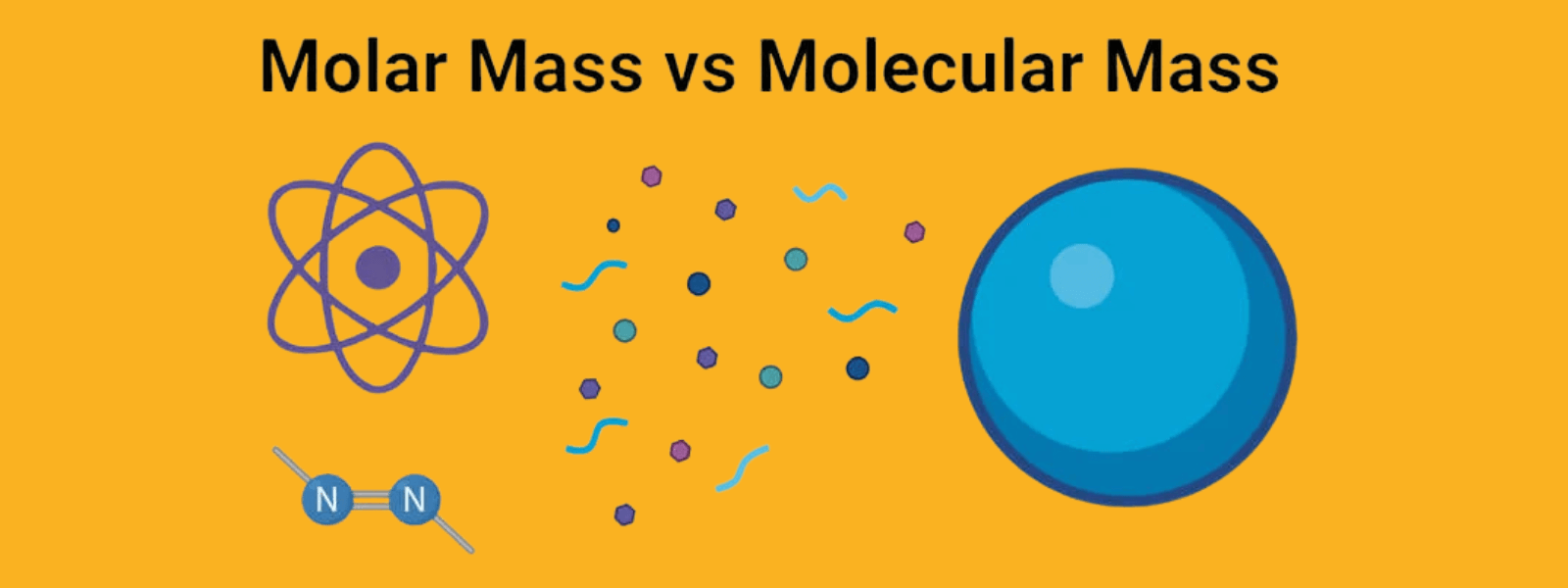Understanding molar mass and molecular mass can seem tricky, but it is simpler than it looks. These two terms often come up in chemistry, yet they serve different purposes. Molar mass tells us the mass of one mole of a substance, while molecular mass focuses on the mass of a single molecule.
In this blog, we will break down Difference Between Molar mass and Molecular mass. You will see where each term applies and how to use them correctly. Let’s clear up the confusion of molar mass vs molecular mass step by step.
If you are unsure about what mass is, check out our guide: What is Mass?
Molar mass
Molar mass is the weight of one mole of a substance, measured in grams per mole. It helps chemists calculate amounts in reactions accurately.
Molar mass of H2SO4,
The molar mass of H2SO4 (sulfuric acid) is calculated by summing the molar masses of its constituent atoms:
- Hydrogen (H): 2 × 1.008 g/mol = 2.016 g/mol
- Sulfur (S): 1 × 32.06 g/mol = 32.06 g/mol
- Oxygen (O): 4 × 16.00 g/mol = 64.00 g/mol
Total molar mass:
2.016 + 32.06 + 64.00 = 98.076 g/mol
Thus, the molar mass of H2SO4 is 98.076 g/mol.
Molecular mass
Molecular mass is the weight of a single molecule, calculated by adding the atomic masses of each atom. It’s measured in atomic mass units (amu) for precision.
Difference Between Molar mass and Molecular mass
| Feature | Molar Mass | Molecular Mass |
|---|---|---|
| Definition | The mass of one mole of a substance. | The mass of a single molecule. |
| Unit of Measure | Grams per mole (g/mol). | Atomic mass units (amu). |
| Scale | Macroscopic scale – used for bulk amounts of substances. | Microscopic scale – specific to individual molecules. |
| Calculation | Sum of atomic masses of atoms in a mole. | Sum of atomic masses of atoms in one molecule. |
| Purpose | Useful for lab measurements and reaction scaling. | Useful for molecular composition and precision measurements. |
| Example | Water (H₂O): 18.02 g/mol. | Water (H₂O): 18.02 amu. |
| Applications | Ideal for calculating masses in reactions, balancing equations, and lab preparations. | Ideal for theoretical chemistry, molecular composition, and atomic studies. |
| Avogadro’s Number | Uses Avogadro’s number, representing 6.022×1023 particles. | Does not directly involve Avogadro’s number, focusing on individual molecules. |
| Expression | Typically shown in grams per mole, aiding in practical measurement. | Expressed in amu, helping with atomic and molecular analysis. |
How to convert molar mass to molecular mass?
To convert molar mass to molecular mass, simply express the molar mass in atomic mass units (amu). Molar mass (g/mol) is numerically equivalent to molecular mass (amu), but the units differ.
Molecular mass measures the weight of a single molecule, while molar mass is the weight of one mole of those molecules.
Example,
Consider water (H₂O). Its molar mass is:
( 2 × 1.008 g/mol for H ) + ( 1 × 16.00 g/mol for O) = 18.016 g/mol
The molecular mass is 18.016 amu, the same numerical value as the molar mass.
Why Choose Tutorhelpme Chemistry Tutors
- Experienced Tutors
Our tutors are experts with years of experience in chemistry, helping students understand complex topics easily. - Personalized Learning
We create tailored lessons to match each student’s unique needs, making learning more effective and engaging. - Flexible Scheduling
Sessions can fit your schedule, making it easy to balance studies with other activities. - Exam Preparation
We offer focused support for exams, ensuring students feel confident and ready on test day. - Interactive Lessons
Lessons are designed to be interactive, promoting active learning and better understanding. - Affordable Rates
Get quality tutoring at rates that work with your budget, making top-notch support accessible. - Convenient Online Platform
Learn from anywhere with our user-friendly online platform, making chemistry tutoring simple and accessible.
Choose TutorHelpMe for reliable, effective chemistry tutoring!
Read More Mass in Chemistry? types of mass in chemistry
FAQ’S
How to convert molar mass to molecular mass?
To convert molar mass to molecular mass, divide the molar mass by Avogadro’s number (6.022×1023 ). Molar mass is in grams per mole, so dividing by Avogadro’s number gives the molecular mass in atomic mass units (amu), representing the mass of a single molecule.
Are molecular mass and molar mass the same?
No, molecular mass and molar mass are not the same. Molecular mass refers to the mass of a single molecule, measured in atomic mass units (amu). In contrast, molar mass is the mass of one mole of a substance, measured in grams per mole (g/mol).
What is the other name for molar mass?
The other name for molar mass is molecular weight. However, it’s important to note that “molecular weight” is less precise, as it can refer to molecular mass in amu.

